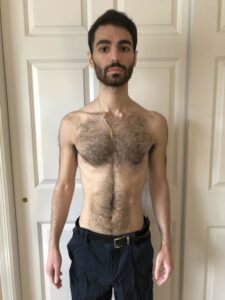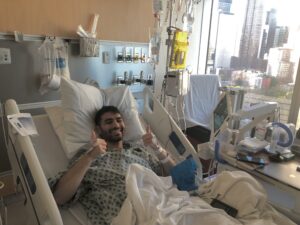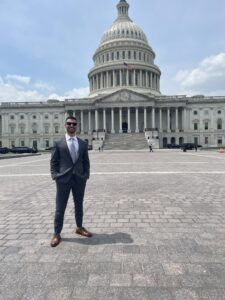And the health professionals that got me there…
It all started in 2018, at the end of my senior year of college. I was accepted to graduate school and enjoyed my final school days by going out with my friends. At this time, I was very grateful for what life had to offer, and I was excited about my future. Unfortunately, one day, I started to see blood in my stool. I went to the physician’s assistant at my college and was told it would go away on its own. The symptoms were sporadic, but I never let them bother me. By October 2018, I started to have uncontrollable urgency to go to the bathroom.
I had a colonoscopy two days before Thanksgiving, and my gastrologist told me my colon was inflamed. Ultimately, my doctor diagnosed me with ulcerative colitis. I was shocked, especially when he told me this could lead to cancer. This was not the news I wanted to hear, but I was motivated to get into remission. By February 2019, I had been to three gastroenterologists and tried many different medications that did not work. It was hard to be social because of the increasing severity of the symptoms. I had gotten so sick that I had to drop an internship opportunity at the United Nations because I was not healthy enough to go into the office. The day I dropped the internship was also my birthday, an isolating reminder of the challenges of my condition.
A Flare in Full Force
The struggles I was battling led to me seeking out alternative options for my healing. I went through a holistic program to tackle my symptoms. Shortly before starting the program, I was forced into to the ER for kidney stones. When I returned from the hospital, I tested positive for Clostridioides difficile, a bacterial infection that causes colitis. I was isolated in my room, not having the ability to leave my room, all while on a bland holistic diet. The diet required that I take an expansive list of different herbs and vitamins. With the infection and my existing symptoms flaring at full force, I was going to the bathroom 20 times a day and lost 20 pounds in two weeks.
After this long battle, I reached remission and increased my weight to 124 pounds. However, this did not last long. I found myself in another flare in May and had a recurrence of Clostridiodies difficile, running to the bathroom again over 20 times daily. After the C. diff passed, I was still in a flare, dropping to 101 pounds. I was exhausted and fatigued to the point where I could barely sleep, eat, walk down the stairs, or stand in the shower. My girlfriend and I broke up, and at such a low point, I was barely living anymore. I would look down at my phone and see my friends live their lives on Instagram and Snapchat, and when I looked up, I would be stuck in my room, unable to do anything but watch TV or play video games. When I would go to the doctor’s office, people would look at me differently due to my frail state.
I quit the holistic diet because it wasn’t helping, and I decided to take Remicade, a common but intense infusion medication that suppresses my immune system. The Remicade immediately put me in remission at the end of June. I told myself I would get into the best shape of my life and return from this disease stronger than ever. I started to work out again, eat healthier, and live my life. I had a newfound perspective on life, appreciating all the little things it had to offer and being able to be free and healthy again. I decided to celebrate with my friends in August 2019 with a party, but I went into another flare that night. Within that month I went to the ER three times because of my flare.
Fearing the Worst
The third time I went to the ER, I met the director of the inflammatory bowel disease center of the hospital where I was receiving care. He told me that I had to have my colon removed. I was surprised and thought I’d need more Remicade because that is what the doctors were saying previously. I learned that my colon was too inflamed. I was in shock, as the thought of having my colon removed was intimidating and life-changing. I didn’t want to have my colon removed. I thought I would never be in a relationship, that people would look at me differently, and that my body would never be the same. I met with my surgeon the next day, and after talking about living with an ostomy, I decided to go through with the surgery – though I didn’t have much choice.
A Life Altering Encounter
Later, I met with my ostomy nurse, Andrew. Andrew changed my whole perspective on ostomies. He taught me how to change an ostomy bag and told me I would be able to live again, gain weight, and be with my friends. He wanted people to master living with ostomies so patients like myself could live life again to the fullest, and that’s what happened. I gained weight, got back into shape, and expanded my diet. I credit Andrew for giving me a new perspective on life.
In November 2019, I talked to my surgeon about the J-Pouch surgery, where I would get my ostomy reversed so I wouldn’t have to live with one anymore. He told me I was to get a new type of ileostomy bag. I asked my surgeon if Andrew could teach me how to use the new ostomy. Then I remember a long silence before the head ostomy nurse of the department was brought in. That’s when she put her hands on my knees and said, “I’m sorry I have to be the one to tell you this, but Andrew passed away.”
I was shocked. Andrew instilled so much positivity and pride in my new lifestyle, and now he was gone. I was crushed, knowing he would never know I was healthy and confident again and never know how much he had changed my life for the better. With Andrew’s passing, I decided to embrace a new mission and spread awareness about living with an ostomy.
Complications
My J-Pouch surgery was in December 2019, and unfortunately, I had many complications. In January 2020, I started to have very high ostomy output. I could barely eat, had intense heartburn like my chest was on fire, and would vomit bile multiple times a day. In February, I was in the hospital for three weeks with the medical team, trying to slow my output down and examining me to see if anything else was causing my complications. My surgeon decided to close my ileostomy up early. Sadly, I was not getting better and was back down to 105 pounds.
I got diagnosed with pouchitis within two weeks of being home at the start of COVID-19, and my doctor put me on antibiotics. On the antibiotics, I felt as if I had a normal J-Pouch. As soon as I went off of them, I went back to the bathroom multiple times. I was in this cycle of being on antibiotics for two months and found out I had an anal fistula, then was diagnosed with “Crohn’s-like” pouchitis. I knew something wasn’t right, especially since I saw all these problems after my J-Pouch surgery. I found Dr. Remzi from NYU Langone Health online, whose specialty was redoing J-Pouches.
To Hope
I met Dr. Remzi, and he told me two things that no other doctor told me: “You’re going to have a great life, and we’re going to take great care of you.” Those words connected with me on such a profound level that I felt I had found the right doctor to give me my life back again. The plan was to provide me with a temporary ileostomy in July 2020, then six months later, perform the J-Pouch surgery again. Finally, they would close me up three months later.
I was excited to get the ileostomy back again. I felt confident having my bag around and loved living without the complications I had before. However, I decided to push the J-Pouch surgery from January 2021 to October 2021 because I needed a break from surgeries. During this break, I made incredible memories. I went on vacation with my friends to the Outer Banks in North Carolina. I would go out at night with my friends and was freed from the bathrooms. I was at a wedding where two of my best friends married each other. My ostomy allowed me to be free again, and that freedom was something I hadn’t felt in years.
Two days before my J-Pouch surgery in October, I met Andrew’s family. At that moment, I felt a hole in my heart closing because although Andrew will never know how much he meant to me, his loved ones know. I told her how much he impacted my life. I told her about the positivity he gave me during one of the lowest periods of my life. I told her how he had changed my perspective on life. After the J-Pouch surgery, Dr. Remzi believed I had a Crohn’s component to the J-Pouch, but it wasn’t Crohn’s disease. He wanted me to go on a biologic to prevent the possibility of developing Crohn’s disease. I began taking Stelara to prevent these symptoms from developing. At the end of March 2022, my ileostomy was closed.
What Life Looks Like Now
Since the closure, I’ve been living my life to the fullest. I go out with my friends, and I am in the best shape of my life. I tirelessly spread awareness of IBD, and now work at NYU Langone. Throughout these years, I’ve learned many lessons. Be grateful for the little things, like the ability to walk up and down the stairs, and the bigger things too, like your family, and your friends. Embrace your body, no matter the scars or ostomy. Better yet, show them off. Prioritize yourself, and your health first. Don’t push yourself if you’re not feeling well, and plan for the unexpected. There will be new opportunities in place of missed ones, and healing should always be a priority. Most importantly, believe in yourself. You’re a lot stronger than you think.
Having IBD can be scary. Everyone has a different experience. Some are undergoing multiple surgeries, and others are staying in remission through biologics. Still, we’re part of a community that wants to help each other as much as possible because we know the struggle of having the disease. I want my story to be heard, so people can know they’re not alone, and that there is a light at the end of the tunnel. I want them to remember Andrew. I want them to remember want he wanted me and all of us to know. I want them to remember the message he shared that changed my life: we can live life to the fullest.









